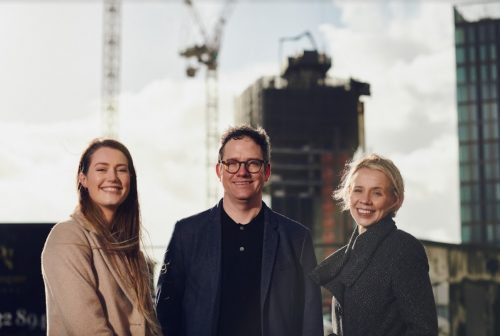Development increases during 2021, in spite of pandemic impact

Both Manchester and Salford enjoyed heightened levels of development during 2021, led by strong residential and education activity.
Thirty five new schemes were completed last year, while 67 are currently under way, according to Deloitte’s latest Regional Crane Survey, which is now in its 22nd year.
The research monitors construction activity in a range of sectors, including offices, residential, hotels, retail, education and student housing.
Findings show that residential was responsible for most activity in the region last year, with 5,549 new homes delivered, the highest number recorded in a single year.
Central Salford was the main recipient of this development activity, with 53% of the new homes, following completion of Embankment West, The Filaments on Gore Street, and Middlewood Locks, Phase 2, amongst others.
In addition to this, 14 new residential developments broke ground in 2021, which will yield 3,729 new homes, adding to a pipeline that now has 10,717 residential units under construction across 40 sites.
John Cooper, partner at Deloitte, said: “Whilst there are robust levels of construction for new residential developments, levels are reaching a more stable point of equilibrium. Yet, despite fewer residential units under way, it is key to note that overall volume of residential properties under construction remains the highest of any city outside of London.”
While residential led the way, commercial development fell short of 2020 figures, which was an exceptional year having recorded the highest levels since 2008. Development levels last year were two thirds (66%) less in 2021, totalling 404,584 sq ft across four completed schemes. Overall, 1.34 million sq ft of new office space is under construction, with almost half of this currently pre-let (43%).
And while most on-site office schemes were new builds last year, the survey found a growing trend for refurbishments, with more than a quarter (28%) in Manchester being refurbishments, against new build.
John Cooper said: “ESG climate-related targets and occupier demand is set to drive a future pipeline of new building office development with exceptional ESG credentials.
“It also means an increased delivery of new floorspace being supported through refurbishment projects. Asset managers are looking to build resilience into existing buildings that struggle to meet regulatory requirements, due to be brought in during 2023 and 2030.”
The latest survey revealed that 938,876 sq ft of new education and research floorspace was completed in 2021, which was the largest amount delivered on record and included the opening of the new Manchester Engineering Campus.
A further 518,836 sq ft of education and research space is under construction.
Meanwhile, the number of hotel bedrooms under construction in 2021 – 1,975 across eight schemes – represented a 17% decrease from the previous year. Many of these schemes are within City Core, where there are six schemes under construction representing 1,525 hotel beds.
And even in the face of travel restrictions due to the pandemic, two new hotel schemes started in 2021, both located within the heart of the city centre.
Throughout 2021, the number of retail and leisure completions continued to rise, with 143,848 sq ft of retail and leisure floor space completed.
This is an increase of 35% from 2020 (106,700 sq ft) and well above the average annual level since 2014. There is a further 477,558 sq ft of retail and leisure space under construction, largely brought forward as part of mixed-use developments, or new cultural offers benefitting from both public and private investment.
Simon Bedford, partner at Deloitte, said: “Despite the overall level of construction cooling down from an intensely busy period of city centre regeneration, it’s encouraging to see resilience in activity across Manchester and Salford.
“As restrictions continue to lift and uncertainty wanes, the city has plenty of opportunity with a healthy pipeline of development, especially in mixed use schemes, pointing to confidence in regional city centres.”
John Cooper added: “The pandemic has brought many changes, from the way we work, to our retail habits. Regionally we’re seeing this reflected in schemes switching use to fill gaps in areas of surging demand. For example, in Manchester, department stores are to be flexibly repurposed to satisfy the demand for new workspaces.
“There are a spate of exciting developments across the education sector, in particular, with construction of new higher education facilities closely linked to the jobs and skills needed to diversify the economy and support business growth.
“Not only will this help to attract younger people to study, but also potentially live and work in the centre – contributing to Salford and Manchester’s growth.”








